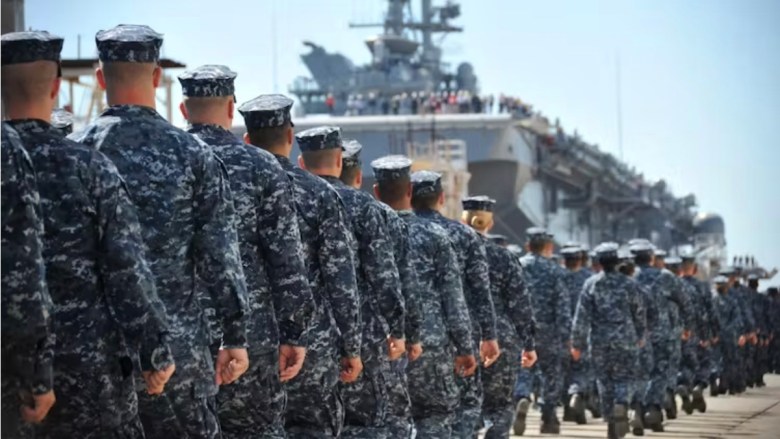Top Stories
Trump Intensifies Military Strikes Against Latin America’s Drug Cartels

US President Donald Trump has escalated military efforts against drug trafficking in Latin America by deploying a naval task force to the Caribbean. Since the start of September 2025, this initiative has resulted in strikes on four boats suspected of transporting drugs off the coast of Venezuela, leading to the deaths of at least 21 individuals. The strikes have drawn sharp condemnation from both Venezuela and Colombia, with international legal experts and human rights organizations questioning their legality.
Human Rights Watch has characterized the strikes as potential “unlawful extrajudicial killings.” Despite this backlash, Trump indicated that military operations would persist. On October 3, following an attack that killed four people, US Defense Secretary Pete Hegseth asserted via social media that these strikes would continue until threats to the American populace cease. Trump has claimed, without providing evidence, that one of the boats targeted carried enough drugs to kill between 25,000 and 50,000 people.
The Trump administration appears to be contemplating a second phase for its Caribbean campaign. During remarks at a US Navy base in Virginia on October 5, Trump stated that drug traffickers have been deterred from sea routes, prompting a shift in focus to land-based operations. A leaked memo sent to Congress earlier suggested that the US government views its engagement with drug cartels as a “non-international armed conflict.”
Nicolas Maduro, the Venezuelan leader, has been labeled by the White House as a pivotal figure in the Latin American drug trade, although substantial evidence supporting this claim remains scarce. As military pressure against cartels intensifies, experts warn that a broader confrontation may not be the most effective strategy.
Military Action and Potential Backlash
Some analysts, including the Washington Office on Latin America, argue that the US military’s capabilities could disrupt cartel activities, dismantle drug labs, and capture key leaders. Yet, military engagement poses significant risks. Cartels, known for their vengeful tactics, may retaliate against US military personnel and civilians. Historical precedents, such as the violent response from cartels following former Mexican President Felipe Calderón‘s military crackdown in 2006, raise concerns about potential escalations.
In a recent interview, US Homeland Security Secretary Kristi Noem revealed that cartel networks have already issued bounties on several federal immigration agents, offering $10,000 for their deaths and $2,000 for their capture. The threat of violence extends beyond borders, as these networks infiltrate urban and rural areas in the United States, creating a complex landscape for any military initiative.
Targeting high-profile cartel leaders does not necessarily dismantle these organizations. Historical evidence shows that the elimination of figures like Heriberto “El Lazca” Lazcano, the leader of the Los Zetas cartel, often leads to increased violence and fragmentation within the cartels, generating even more violent successors.
Addressing the Root Causes of Drug Trafficking
The surge of fentanyl and other opioids from Latin America has significantly contributed to the ongoing drug crisis in the United States. According to the US National Institute of Health, more Americans died from fentanyl-laced drugs in 2021 than in all US conflicts since World War II. The DEA identifies Mexican criminal organizations, particularly the Sinaloa Cartel, as key players in the production and distribution of these harmful substances.
To combat the influence of cartels effectively, experts state that the US must also tackle domestic addiction issues. A national survey conducted by American Addiction Centers in 2023 found that approximately 48.5 million Americans aged 12 and older have faced substance use disorders, representing 16.7% of the total population. A comprehensive strategy against drug trafficking must encompass efforts to reduce addiction within the US, as any military action without addressing these underlying issues may yield only temporary solutions.
As the Trump administration continues to pursue its military strategy against drug cartels, the long-term effectiveness of such measures remains uncertain. The complexities of the drug trade, combined with the potential for violent backlash and the necessity for a holistic approach to addiction, suggest that a multifaceted strategy will be essential for meaningful progress.
-

 Business5 months ago
Business5 months agoKenvue Dismisses CEO Thibaut Mongon as Strategic Review Advances
-

 Lifestyle4 months ago
Lifestyle4 months agoHumanism Camp Engages 250 Youths in Summer Fest 2025
-

 Sports4 months ago
Sports4 months agoDe Minaur Triumphs at Washington Open After Thrilling Comeback
-

 Sports5 months ago
Sports5 months agoTupou and Daugunu Join First Nations Squad for Lions Clash
-

 Top Stories5 months ago
Top Stories5 months agoColombian Senator Miguel Uribe Shows Signs of Recovery After Attack
-

 World5 months ago
World5 months agoASEAN Gears Up for Historic Joint Meeting of Foreign and Economic Ministers
-

 Health4 months ago
Health4 months agoNew Study Challenges Assumptions About Aging and Inflammation
-

 Business5 months ago
Business5 months agoOil Prices Surge Following New EU Sanctions on Russia
-

 Entertainment4 months ago
Entertainment4 months agoDetaşe-Sabah Violin Ensemble Captivates at Gabala Music Festival
-

 Entertainment4 months ago
Entertainment4 months agoBaku Metro Extends Hours for Justin Timberlake Concert
-

 Top Stories5 months ago
Top Stories5 months agoRethinking Singapore’s F&B Regulations Amid Business Closures
-

 Business5 months ago
Business5 months agoU.S. House Approves Stablecoin Bill, Sends to Trump for Signature









